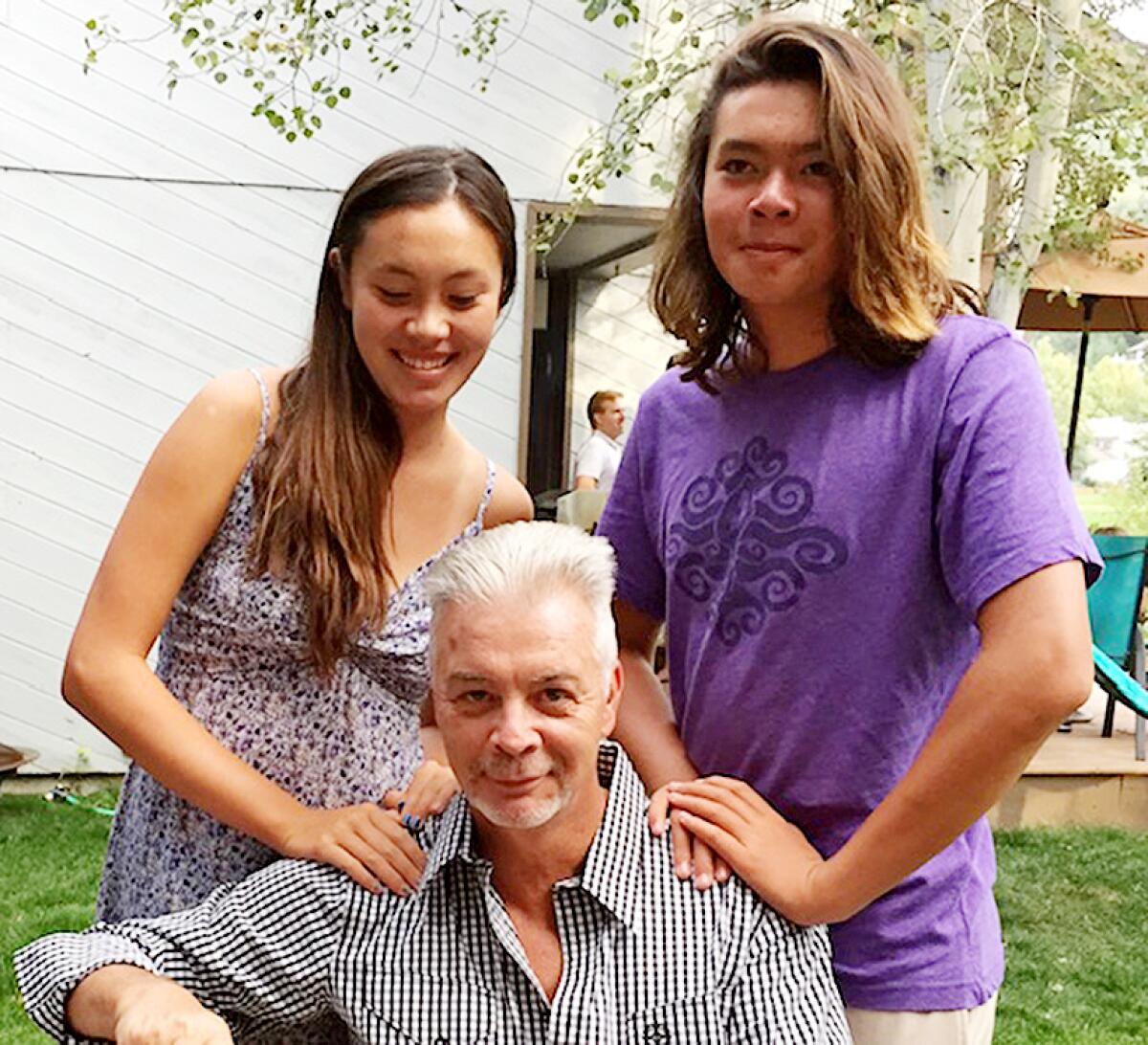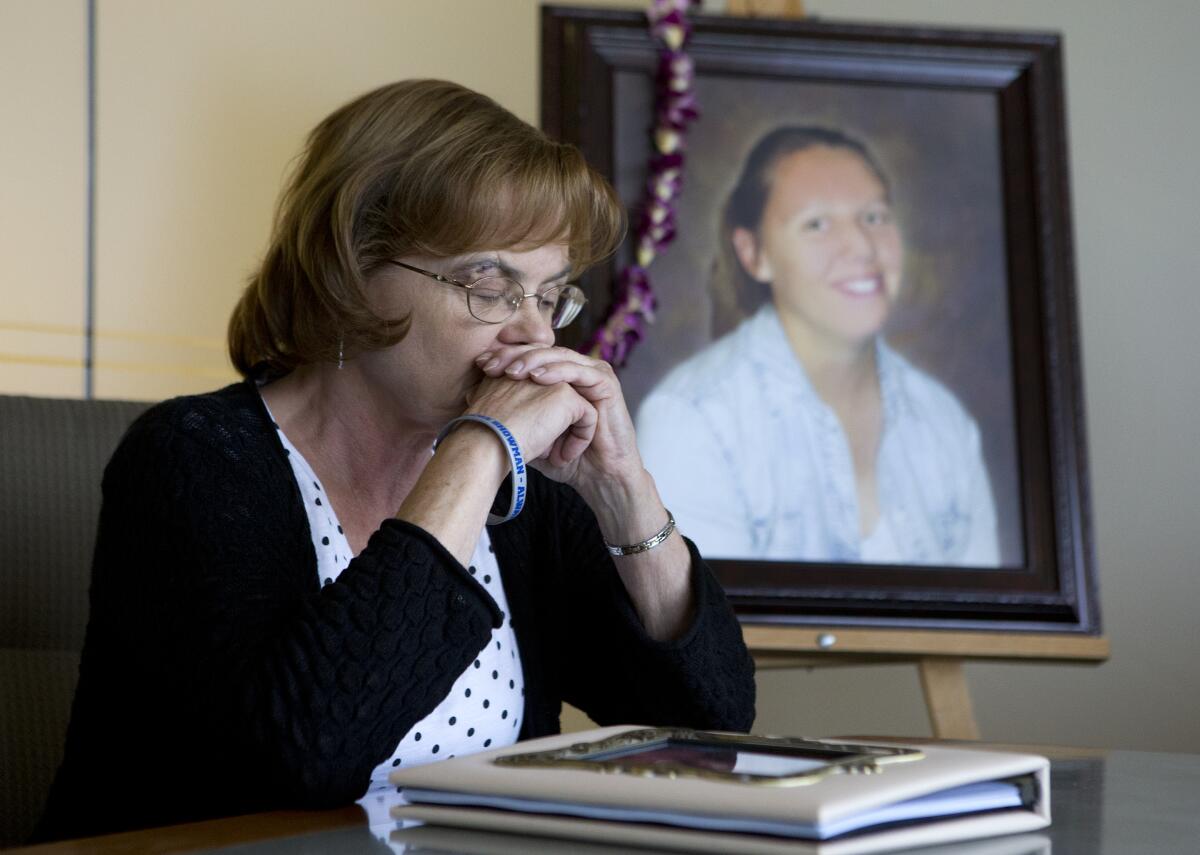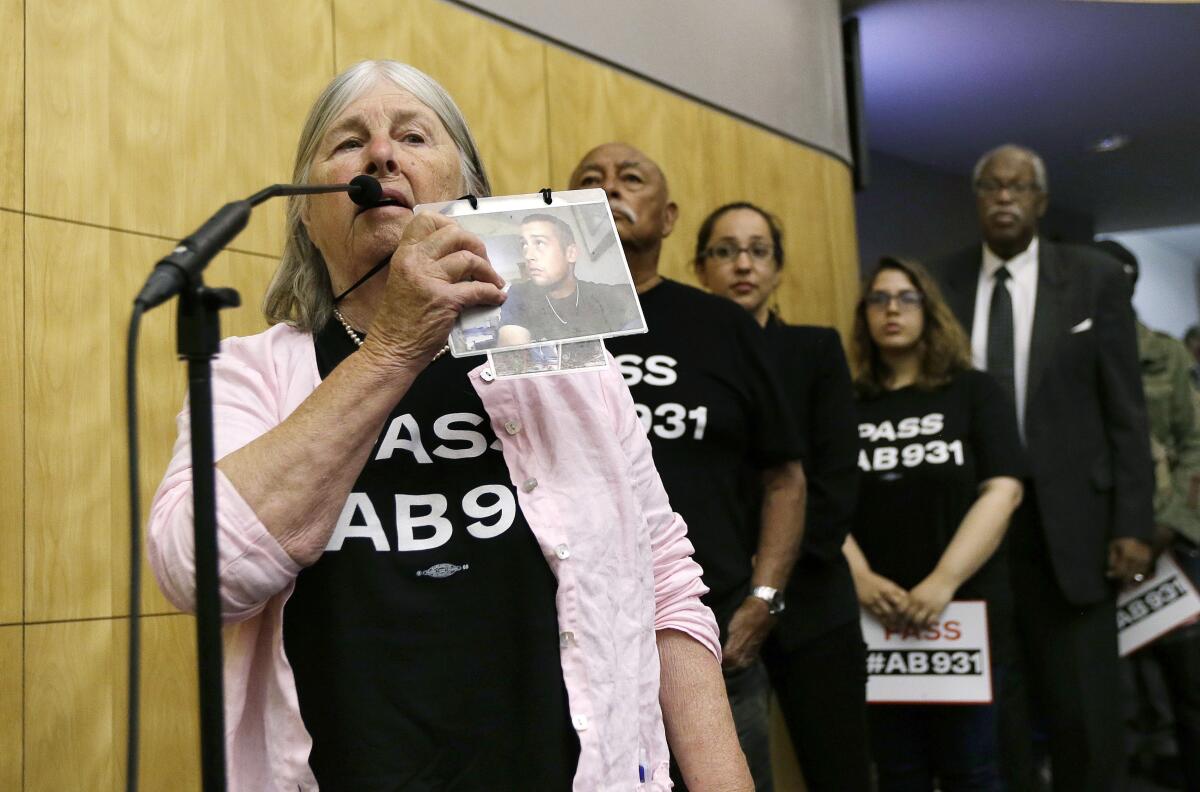After police killings, families are kept in the dark and grilled for information

- Share via
Luke Smith, 15, high on acid and suffering from severe mental health issues, stabbed his father and uncle before fleeing into the early-morning darkness on Nov. 19, 2016.
As the men were airlifted to a hospital, deputies from the Santa Cruz Sheriff’s Office closed in on Luke, who was still armed with a knife. They fired beanbags and sent in a dog, but Luke refused to drop the weapon. An officer opened fire, killing the teen.
That night, when detectives grilled Luke’s father at the hospital, they didn’t mention that police had killed his son. Sedated on painkillers, Ian Smith answered their questions, telling them about the boy’s drug use, poor impulse control and suicidal thinking in hopes the information might mitigate his son’s culpability.
“What’ll they do to him?” he said, according to a recording of the interview.
“I don’t know how much time someone would do for that in juvenile hall,” a detective said. Police records show that he knew Luke had been killed.
It was only when the detectives stepped out of the room, department and medical records show, that Smith learned of his son’s death — from a doctor who had come to check on him.
The omission was not an accident, and it was not unusual. For years, law enforcement agencies across California have been trained to quickly question family members after a police killing in order to collect information that, among other things, is used to protect the involved officers and their department, an investigation by the Los Angeles Times and the Investigative Reporting Program at UC Berkeley’s Graduate School of Journalism has found.

Police and prosecutors routinely incorporate the information into disparaging accounts about the people who have been killed that help justify the killings, bolster the department’s defense against civil suits and reduce the amount of money families receive in settlements and jury verdicts, according to police reports, court records and interviews with families and their attorneys.
The Times and the Investigative Reporting Program documented 20 instances of the practice by 15 law enforcement agencies across the state since 2008. Attorneys specializing in police misconduct lawsuits say those cases are just a fraction of what they describe as a routine practice.
“I have seen this over and over and over again,” said Dale Galipo, a Los Angeles attorney who has filed hundreds of police-shooting lawsuits.
“I had no inclination whatsoever that Luke had been killed until all this information had been pulled out of me,” Smith recalled in a recent interview. The detectives “build empathy with us and then take all of this information out of us when we’re doped up on painkillers, when we’ve just experienced the trauma of our lives.”
The practice has been championed by Bruce Praet, a lawyer and co-founder of Lexipol, a company that hundreds of police departments and district attorney offices across California have hired to train officers and prosecutors on police tactics and avoiding lawsuits.
Through a spokesperson, Lexipol declined interview requests. Praet defended the tactic in a brief interview, saying families will lie or refuse to speak to investigators once they know a loved one has been killed by police.
“I advocate getting to the truth — unbiased, untainted,’’ he said in an interview. “Shouldn’t [investigators] get that before this person is tainted and all of a sudden in a defensive mode?”
In an online training seminar reviewed by The Times, Praet instructs detectives to approach a mom before she learns her son has just been killed by police: “You got about five, 10, 30 minutes to get out there before word gets back on the street — that bad guy is either in the hospital, dead, jail, whatever.”
Many policing experts condemned the practice.
“The best approach is the straightforward one,” said Michael Gennaco, a consultant who advises police departments across the country on how to conduct police shooting investigations. “It’s important to be straight with family members who’ve lost someone to police deadly force.”
Rick Myers, a retired police chief and former president of the Major Cities Chiefs Assn., was more blunt.
“It’s inhumane,” he said.
‘Married to that evasive concept called the truth’
In the 1970s, Praet became a police officer in Laguna Beach, a wealthy town in Orange County, Calif. He told the New York Times that he was sued twice during his 11 years in policing, once by the family of a kidnapping suspect he had shot.
“I know how an officer feels when he has to trust a bunch of lawyers to defend him after all he did was defend himself,” Praet said.
Praet quit policing to pursue a law career and established a reputation as a defender of police, especially the Fresno Police Department and several Orange County agencies. On the side, Praet trained police officers and wrote policy manuals for smaller departments.
In 2003, he co-founded Lexipol, which grew into one of the nation’s largest providers of law enforcement training and policy manuals. It is particularly popular in California, where an estimated 95% of law enforcement agencies are Lexipol customers.

Praet trained officers from more than 100 California police departments and district attorney offices from 2021-2022, according to state records. In 2020, the California Commission on Peace Officer Standards and Training, a public agency that oversees police training in California known as POST, honored Praet with a lifetime achievement award and asked him to help rewrite the guidelines for teaching cops when they can use force.
Lexipol’s marketing materials emphasize that departments can slash what they pay to settle lawsuits by implementing its training methods and adopting its policies.
“The idea of reducing legal liability seems to be front and center in their pitch,” said Joanna Schwartz, a UCLA law professor who has co-written two papers critical of Lexipol.
In one seminar highlighted by Schwartz, Praet recommended that officers who use force against people in mental health crises should describe them in their reports as appearing to be on drugs because “jurors don’t like druggies.”
In another seminar, Praet showed off a police photograph of a man who had just been mauled by a police dog. He noted with approval how the police photographer had posed the man with his arm draped over the police dog while smiling and flashing a gang sign. “That was Exhibit One in the lawsuit, guys.”
POST officials declined to say whether the agency sanctions Praet’s method of extracting information from families of people killed by police officers.
Of the 20 examples The Times found of officers in California using the tactic, 18 involved police departments that have been Lexipol clients.

Subscribers get exclusive access to this story
We’re offering L.A. Times subscribers special access to our best journalism. Thank you for your support.
Explore more Subscriber Exclusive content.
Praet spells out his strategy for investigating police shootings in a 53-minute training video titled “It’s Your Story: Tips for Writing More Effective Police Reports,” which was available on Lexipol’s website until early last year, when it and several other Praet seminars were abruptly removed. In the video, Praet says that a key goal is to get families talking candidly before they know their relative is dead.
“Before the dust settles, I want you sending a uniform[ed officer], detective, I don’t care, somebody out there, to their friends and family to find out what they’ve been up to for the last 24 hours,” he says.
“Hi Mrs. Jones. We’ve had contact with your son,” Praet instructs officers to say to the mother of someone who’s just been killed by police. “We’re trying to figure out what he’s been up to.”
Praet then acts the part of the exasperated mother.
“Oh, you know what?” Praet improvises, “He got laid off. His girlfriend broke up with him. His dog died. He’s been on a drinking binge. He’s been — meth all week long. See that hole in the wall? He just punched his fist.”
When the imaginary mother asks about getting her son out of jail, Praet instructs officers to “get a very concerned look on your face.” Using a somber voice, he demonstrates how they should break the news: “Say: You know what Mrs. Jones? I regret to inform you, your son was involved in a shootout with the officers, and he didn’t survive.”
“What my, my son, the Eagle Scout? No!”
Praet breaks character and makes the sound of a game show buzzer. “Sorry lady,” he says. “You’re married to that evasive concept called the truth.”
In an interview in June, Praet claimed he could not recall the training session, which he recorded in February 2019, even after being read excerpts of what he said. Praet also denied ever advising investigators to withhold information from families whose relatives had just been killed by the police.
“Do I advocate getting out there as early as possible and getting information? The truth from family, friends, associates, co-workers? Absolutely. Get it all while it’s still fresh, while it’s still truthful,’’ he said, before cutting off the interview as he left a training seminar he’d just given in Clovis, a suburb of Fresno.
The golden statement that protects police

In 2015, Diana Showman’s parents sued officers from the San Jose Police Department over the death of their 19-year-old daughter.
Showman, who lived with bipolar disorder, had called 911 one morning a year earlier to say she was armed with an Uzi and pointed a black cordless drill at the officers who responded. Mistaking the tool for a gun, an officer shot her.
In their lawsuit, James Showman and his ex-wife, Victoria Caulfield-Showman, argued that officers should have done more to determine whether their daughter was armed and used their training to resolve the standoff peacefully. The lawsuit, they felt, was their only way to hold the Police Department and its officers accountable.
They may have had a persuasive case, especially in California, where large settlements in police shootings are common. But less than two hours after the shooting, two San Jose detectives interviewed Showman’s father in an interrogation room. They knew the teen was dead, but chose not to tell her father, who believed his daughter was being treated at a hospital, according to department records and interviews with Showman’s father.
They maintained the ruse even when Showman said, “I don’t even know if she’s alive,” a recording of the interview shows. They pressed him for more information about his daughter’s mental health history.
Twenty-seven minutes into the interview, Showman asked, “Is she alive?”
“I’m sorry,” a detective said. The interview ended minutes later.
Police repeatedly use these types of statements by relatives to defend themselves in the press and in court, police and court records show. Departments share details collected from family members with reporters to paint those shot as criminals or drug addicts. Internal affairs investigators and district attorneys cite them in their reports justifying the killings. And when families sue the police for excessive force or misconduct, the department’s defense attorneys include the statements in motions to quash the case and present them as evidence to juries.
The statements gathered by police can have the biggest effect at the end of these civil lawsuits.
The size of a settlement or verdict can hinge in part on whether the person shot had a history of drug use, mental health issues, homelessness, or family strife. If lawyers defending the officers and their department can show that such problems limited how much money the person stood to earn over their working years, the payout drops.
In other words, the more disparaging information the police have about someone they’ve killed, the less money the department may have to pay.
In Showman’s case, authorities made thorough use of the statement her father gave to detectives about his daughter’s history of violent outbursts and suicide attempts.
When county prosecutors cleared the officer who shot Showman of criminal wrongdoing, a report explaining their decision relied heavily on James Showman’s statements to detectives.
“[Showman] believed that his daughter was capable of presenting a firearm to police in order for the police to shoot her,” the report said. “He said Diana Showman was severely unstable at that time.”
In the family’s lawsuit against the department, James Showman said the department’s first settlement offer included a cash settlement. But after the Showmans and their attorney declined what they saw as a lowball offer, the department returned with a lower one: a promise of new police training, but no financial award. Showman’s statements to investigators were the “icing on the cake,’’ the family’s attorney, Jaime Leaños said, and the family felt they had no choice but to accept.
“I will beat myself up the rest of my life for the amount of information I told them,” Showman said in an interview.
“I had no inclination whatsoever that Luke had been killed until all this information had been pulled out of me.”
— Ian Smith

Luke Smith’s family learned a similar lesson. Six months after his death, Luke’s family sued the Santa Cruz Sheriff’s Office. At every stage of the case — during depositions, in motions to dismiss the case and in settlement negotiations — the sheriff’s lawyers kept returning to what Luke’s father had divulged to detectives at the hospital in order to argue that his life was worth less.
The family settled for $2.5 million, an amount their lawyer, Michael Haddad, said was affected by what the detectives learned from Luke’s father. “It was their position, the defendant’s position, that the case was worth a lot less because they contended that Luke was so troubled.”
Wayne Smith, one of the detectives who interviewed James Showman, acknowledged in an interview that he and his partner had withheld news of the woman’s death, and said he had used the same tactic with other families. Now retired, Smith said he likely learned the tactic as a rookie from a field training officer. If the family of someone killed by the police characterized their loved one as a “dirtbag,” he said, it could help the department defend itself in civil court.
“That’s a golden statement because it protects the police,” he said.
(Smith later backtracked on those comments, saying it was not the job of a police officer to gather information that can be used to protect the officer’s department.)
Julie and Rick Perez unwittingly offered up a golden statement when a detective from the Richmond Police Department and an investigator from the district attorney’s office knocked on their door at 4:20 one morning in 2014. A few hours earlier, an officer in the Bay Area city had fatally shot their son.

When Julie Perez asked if her son was in trouble, the investigator said, “I’m going to get to that in a second,” according to a recording of the encounter first published by KQED.
The investigator launched into a series of questions about their son. Did he use drugs? Did they have a good relationship? Did he have problems with the police? Did he have “demons to conquer?” Unknown to Julie and Rick Perez, the investigator and the detective were secretly recording their responses.
“We’re not trying to trick you or nothing,” the investigator told the increasingly agitated parents.
“I hope he’s not in big trouble, and I wish you guys would get to the punch line,” Rick Perez said 10 minutes into the interview.
“I don’t know how to say this,” the investigator said.
Rick Perez finished his sentence: “You guys shot him.”
When the couple filed a lawsuit, it became clear that the city intended to defend itself by focusing heavily on what they and other family members had disclosed to investigators. The thought of having their family’s worst secrets and darkest moments spilled in open court was a factor in the family’s decision to settle with the city for $850,000.
“If we had taken it all the way to trial, these were going to be the kind of things that they were going to start bringing out,” Julie Perez said.
Years later, she still can’t believe a detective would secretly record her while she was in her nightgown, confused and worried for her son.
“I felt like somebody came into my house and mentally raped me,” she said.
‘We do that. I used to lie to suspects all the time.’
In several cases identified by The Times, investigators created the impression that the people they were questioning could themselves be in trouble, leaving some to conclude they had no choice but to cooperate.
In 2015, after a Gilroy police officer shot and killed Sovonnah Flores’ fiance in front of her apartment building, detectives escorted Flores to a police interrogation room. Detectives questioned her aggressively for more than an hour, at one point warning that if “you’re lying to us, that’s going to look very bad,” records show.
In 2020, Orange County sheriff’s deputies shot and killed Laurie Terryah’s boyfriend when they responded to a call about the boyfriend smashing up her apartment. After the shooting, deputies kept Terryah for nearly two hours in a patrol car, where she was questioned by investigators. They asked about the boyfriend’s history of domestic violence and drug use, records show. Then they asked about her past arrests and whether she was on probation. After finally breaking the news of her boyfriend’s death, the investigator asked Terryah to sign a consent form allowing him to search her apartment.
“So I’m in trouble now, too?” Terryah asked. The officer assured her she was not, and she signed the form as she sobbed.
Wayne Smith, the San Jose detective who interviewed Diana Showman’s father in an interrogation room, acknowledged the messy optics of these tactics. “I’ll admit it doesn’t look good, but it gets to the truth,” he said.
“Ultimately what we want is just the truth of the matter, kind of like the police being able to lie to suspects to get the truth,’’ he added, echoing one of Praet’s defenses of the tactic. “We do that. I used to lie to suspects all the time.”
It is an imperfect comparison. While police lie to criminal suspects in an effort to solve crimes, Gennaco, the policing expert, said lying to the family member of someone who has been killed by police offers no such payoff.
“You can’t prosecute somebody who’s no longer with us,” he said.

By the time Garden Grove officers forced Crystal Leff into an interrogation room, there was no one left to prosecute.
Leff picked up her ex-boyfriend, Vic Steven Disanzo, on Sept. 18, 2018, after he’d been released from jail. When the pair began to fight, a witness called the police. The officer who responded shot Disanzo twice in the chest. The officer said he thought Disanzo was choking Leff.
As police and paramedics swarmed the scene, an officer took Leff to the hospital to be checked for injuries, then to a police station.
Investigators questioned Leff, who was wearing nothing but a hospital gown, about Disanzo’s background, according to a transcript of the interview.
“Did he have issues, mentally?”
“Was he the kinda guy that got into trouble?”
“Does [he] have anger issues?”
Afraid she’d be charged with a crime, Leff felt compelled to answer their questions. “I didn’t want to go to jail, and I was just telling them s— that was none of their business,’’ Leff said.
Investigators went out of their way to leave the impression Disanzo was still alive, even asking if Leff wanted to press charges against him. “In my mind, he was alive, and I was mad at him for bringing the cops around,” she recalled.
Only when they were walking her out of the police station did investigators inform her of Disanzo’s death. Furious at the way she was treated, Leff sued the city of Garden Grove for violating her rights by detaining her.
Garden Grove settled with Leff for $100,000.
Howey is a freelance journalist. He reported this story while at the Investigative Reporting Program at UC Berkeley.
More to Read
Sign up for Essential California
The most important California stories and recommendations in your inbox every morning.
You may occasionally receive promotional content from the Los Angeles Times.













